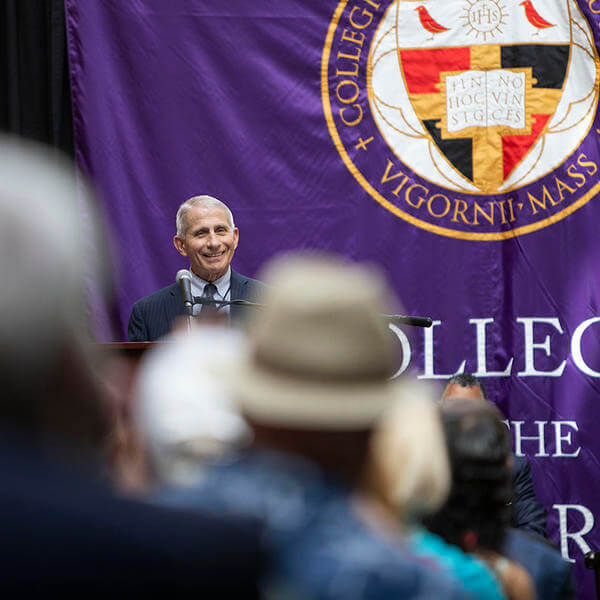Warm greetings to you all and thank you so much President Rougeau for that kind introduction. Really, I’m terribly moved. How wonderful it is to be back here on Mount St. James at the College of the Holy Cross at this very special occasion of my 60th class reunion.
Sixty years — it’s really tough to get your head around that. I wonder what I would have thought as a student back then and saw some old guy up here talking about 60 years ago. I probably would have asked myself, “Do people really last that long?” Well, here we are and we’re still showing up. So it must have been the mystery meat they served us in Kimball in 1958 when I first came here.
But, seriously, it’s such a great pleasure to see so many of my old friends and colleagues, some of whom I haven’t seen in actually 60 years, but others who I've kept in touch with. And, Cooz [Bob Cousy '50], thank you so much for showing up. It’s such a great pleasure.
When I arrived at Holy Cross in September of 1958, I checked into Wheeler Hall as a classics major with a pre-med concentration. Now, six decades is a long time ago, but there are several salient memories from my college days that are still embedded in my conscious and subconscious awareness. One, is what I saw yesterday and today, the striking beauty of this campus. But another is the deep friendships that have prevailed over decades.
Another is the fundamentals of science that I learned right here on this campus, and what I would have learned in this building were it in existence. It has served, literally, as the foundation of whatever scientific contributions that I may have made and that I continue, hopefully, to make. However, another is the uniqueness and the attractiveness of the humanities courses that I took despite the fact that I was pre-med. The courses were heavily weighted in Greek, Latin and French, and included an extensive portfolio of classes in philosophy, epistemology, metaphysics, philosophical psychology, ethics and logic. When I tell people today that I did that, they think maybe there’s something wrong with me. Not really, it really helped.
And one of the most important things I ever did, quite sincerely, was to balance the science that I learned in physics, chemistry and biology with being introduced to the history of people, civilizations and the humanities. Because if I had chosen a different pathway to medicine and science, I might not have wound up in the public health career that I have, addressing such challenges as HIV/AIDS, pandemic flu, Ebola, Zika and, of course, our current crisis with COVID-19. So everything I do, from my basic research, to my care of individual patients, to my responsibility to the groups of patients in a clinic trial, to my responsibility to domestic and global public health, to advising seven presidents of the United States — almost of all of whom actually listened to me, it truly is all rooted here in my education at the College of the Holy Cross.
Concern for the condition of mankind, not just those in my personal bubble whom I love and care about, but people across all strata of society and around the world, has been my major focus. I directly relate that to my humanities training here at Holy Cross and to the Jesuit emphasis on social justice and service to others. To this day, that broad perspective has been invaluable to me as a public health official grappling with the challenges posed by the global pandemic of COVID-19, among larger issues of health inequities and political divisiveness that has been laid bare by this pandemic.
In addition to service to others, two other Jesuit tenets have been invaluable guides throughout my career. Staying faithful to the truth, even truths that may be inconvenient to some, and communicating according to the adage: precision of thought and economy of expression. And for some in Washington, that’s actually an oxymoron. Whether you are communicating to an audience of one or many, as my Jesuit mentors taught me it is most important for people to understand what you are talking about, not for you to show off how smart you are.
So, in closing, I never would have imagined in my wildest dreams when I walked onto this campus in 1958 and looked at the far-smaller number of buildings that are here today, that one day a building — this wonderful integrated science complex — would be named after me. This was a great college 60 years ago and it is an even better place today. And if I were to turn back the clock right now, and I was that 17-year-old kid from Brooklyn, just out of Regis High School, there is no place I would rather be than right here on this campus. So, thank you so much Holy Cross for what you’ve given to me and thank you for this humbling legacy.
Anthony S. Fauci, M.D., '62, Hon. '87 Remarks: Dedication Ceremony

Read Time
4 Minutes


